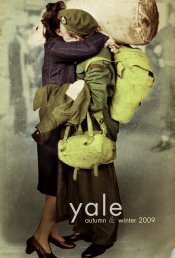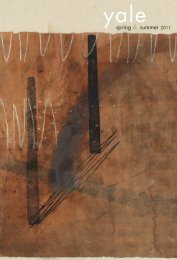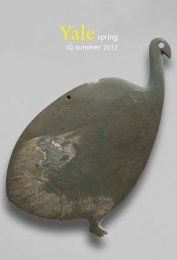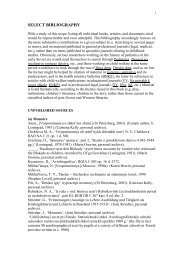View & Download - Yale University Press
View & Download - Yale University Press
View & Download - Yale University Press
Create successful ePaper yourself
Turn your PDF publications into a flip-book with our unique Google optimized e-Paper software.
Talent Wants to Be Free<br />
Why We Should Learn to Love<br />
Leaks, Raids, and Free Riding<br />
Orly Lobel<br />
This timely book challenges<br />
conventional business wisdom about<br />
competition, secrecy, motivation and<br />
creativity. Orly Lobel warns that a set<br />
of counterproductive mentalities are<br />
stifling innovation in many regions<br />
and companies.<br />
In every industry battles to recruit, retain, train, energise and<br />
motivate the best people are fierce. Lobel uncovers factors that<br />
produce winners or losers in the talent wars. Combining<br />
behavioural experiments with observations of contemporary<br />
battles over ideas, secrets and skill, Lobel identifies motivation,<br />
relationships and mobility as the most important ingredients for<br />
successful innovation. Yet many companies relying more on<br />
patents, copyright, branding, espionage and restrictions of their<br />
own talent than on creative energies that are waiting to be<br />
unleashed. Lobel presents a set of positive changes in corporate<br />
strategies, industry norms, regional policies and national laws<br />
that will incentivise talent flow, creativity and growth.<br />
Orly Lobel is Herzog Professor of Law at the <strong>University</strong> of<br />
San Diego, where she is founding member and professor of<br />
the Center for Intellectual Property and Markets.<br />
February 288 pp. 234x156mm. 14 b/w illus.<br />
HB ISBN 978-0-300-16627-9 £25.00<br />
Current Affairs & Economics 73<br />
Through a<br />
Screen Darkly<br />
Popular Culture, Public Diplomacy,<br />
and America’s Image Abroad<br />
Martha Bayles<br />
What does the world admire most<br />
about America? Science, technology,<br />
higher education, consumer goods –<br />
but not, it seems, freedom and<br />
democracy. Indeed, these ideals are in<br />
global retreat, for reasons ranging from ill-conceived foreign<br />
policy to the financial crisis and the sophisticated propaganda<br />
of modern authoritarians. Another reason, explored for the<br />
first time in this pathbreaking book, is the distorted picture of<br />
freedom and democracy found in America’s cultural exports.<br />
In interviews with thoughtful observers in eleven countries,<br />
Martha Bayles heard many objections to the violence and<br />
vulgarity pervading today’s popular culture. But she also heard<br />
a deeper complaint: namely, that America no longer shares the<br />
best of itself. Tracing this change to the end of the Cold War,<br />
Bayles shows how public diplomacy was scaled back, and inyour-face<br />
entertainment became America’s de facto ambassador.<br />
Martha Bayles is the author of Hole in Our Soul: The Loss of<br />
Beauty and Meaning in American Popular Music. She teaches<br />
humanities at Boston College.<br />
November 320 pp. 229x152mm.<br />
HB ISBN 978-0-300-12338-8 £18.99*<br />
Barley, Gold, or Fiat<br />
Toward a Pure Theory of Money<br />
Thomas Quint and<br />
Martin Shubik<br />
Using simple but rigorously defined<br />
mathematical models, Thomas Quint<br />
and Martin Shubik explore monetary<br />
control in a simple exchange economy.<br />
Examining how money enters, circulates<br />
and exits an economy, they consider the<br />
nature of trading systems and the role<br />
of government authority in the<br />
exchange of consumer goods for<br />
storable money; exchanges made with<br />
durable currency, such as gold; fiat<br />
currency, which is flexible but has no<br />
consumption value; conditions under<br />
which borrowers can declare<br />
bankruptcy; and the distinctions<br />
between individuals who lend their own<br />
money, and financiers, who lend others.<br />
Thomas Quint is Professor of<br />
Mathematics at the <strong>University</strong> of<br />
Nevada, Reno. Martin Shubik is<br />
Seymour Knox Professor Emeritus of<br />
Mathematical Institutional Economics<br />
at <strong>Yale</strong> <strong>University</strong>.<br />
January 384 pp. 234x156mm.<br />
6 b/w illus.<br />
HB ISBN 978-0-300-18815-8 £85.00<br />
The Great Mirror of Folly<br />
Finance, Culture, and the<br />
Crash of 1720<br />
Edited by William N. Goetzmann,<br />
Catherine Labio, Timothy G.<br />
Young and K. Geert Rouwenhorst<br />
With a Foreword by Robert J. Shiller<br />
This beautifully illustrated book presents<br />
a unique cultural record of the world’s<br />
first great financial crisis – the stock<br />
market crash of 1720 in France, England<br />
and Holland – as depicted in the art,<br />
literature and commentary of the time.<br />
William N. Goetzmann is the Edwin<br />
J. Beinecke Professor of Finance and<br />
Management at the <strong>Yale</strong> School of<br />
Management. Catherine Labio is<br />
associate professor of English at the<br />
<strong>University</strong> of Colorado Boulder.<br />
K. Geert Rouwenhorst is Robert B. &<br />
Candice J. Haas Professor of Corporate<br />
Finance at the <strong>Yale</strong> School of<br />
Management. Timothy G. Young is<br />
curator of modern books and<br />
manuscripts at Beinecke Rare Book and<br />
Manuscript Library at <strong>Yale</strong> <strong>University</strong>.<br />
<strong>Yale</strong> Series in Economic and Financial History<br />
October 432 pp. 254x178mm.<br />
240 colour + 15 b/w illus.<br />
HB ISBN 978-0-300-16246-2 £50.00<br />
Unbalanced<br />
The Co-Dependence of America<br />
and China<br />
Stephen Roach<br />
The modern-day Chinese and US<br />
economies have been locked in an<br />
uncomfortable embrace since the late<br />
1970s. Although the relationship was<br />
built on a set of mutual benefits, in<br />
recent years it has taken on the<br />
trappings of an unstable co-dependence.<br />
This insightful book lays bare the<br />
pitfalls of the current China-US<br />
economic relationship, highlighting<br />
disputes over trade policies and<br />
intellectual property rights, sharp<br />
contrasts in leadership styles, the role of<br />
the internet and the political economy<br />
of social stability.<br />
Roach describes a way out of the<br />
escalating tensions of co-dependence and<br />
insists that the Next China offers much<br />
for the Next America – and vice versa.<br />
Stephen Roach is former chairman and<br />
chief economist of Morgan Stanley Asia.<br />
He is senior fellow, Jackson Institute for<br />
Global Affairs and School of<br />
Management, <strong>Yale</strong> <strong>University</strong>.<br />
February 288 pp. 234x156mm.<br />
HB ISBN 978-0-300-18717-5 £20.00*












